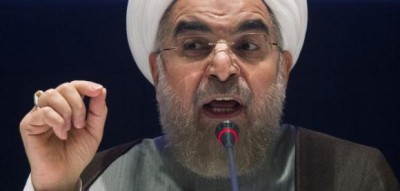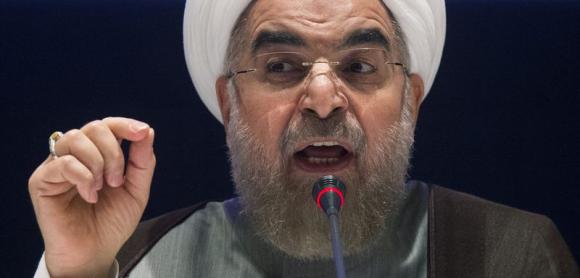
President Hassan Rouhani has threatened to hold an unprecedented referendum in Iran as he warned hardline opponents of a nuclear deal with the west that the country must end its international isolation.
The Iranian leader said he was looking at the possibility of using his constitutional rights to give power to the people in comments that some analysts took as a warning that he may try to put any nuclear agreement to a public vote.
“Our political experience shows that the country cannot have sustainable growth when it is isolated,” he told a conference on Iran’s economy in Tehran on Sunday. He added that this did not mean Iran’s negotiations with six world powers — the US, UK, France, China, Russia and Germany — were compromising the Islamic regime’s ideals of the 1979 revolution.
“Our ideals are not bound to centrifuges. Our ideals are bound to our hearts, brains and determination,” he said.
Mr Rouhani is under pressure from Iran’s hardliners in the parliament and the elite Revolutionary Guards, who insist that nuclear negotiations, which have been extended until July 1, should only be secured if all sanctions are lifted. Many Iranian analysts say the condition sounds almost impossible to achieve, fuelling concerns in Tehran that a deal is out of reach.
While Mr Rouhani called for unity at home, he said he could resort to holding a referendum over “important matters which are important for all people and have impacts on their lives” if his policies were blocked.
“Even if Rouhani has no plan to use this right, he basically threatened that he may ask public opinion about a nuclear deal,” said a reform-minded political analyst. “This can scare his rivals not to insist on impossible things like immediate lifting of sanctions.”
Iran denied an AP story over the weekend suggesting that Tehran and Washington had agreed to ship nuclear material to Russia to guarantee that it could not be used for weapons.
Iran’s economy is suffering from both the impact of international sanctions over the nuclear programme as well as the falling oil price.
Tehran, which had initially blamed its main rival Saudi Arabia for embarking on an oil war to undermine the Islamic Republic, said it now recognised that there were other market forces at play.
Bijan Namdar Zanganeh, Iran’s oil minister, said on the sidelines of the conference on Sunday that excessive supply in the market was partly related to the rise in production of shale oil. He said Iran would strive to protect its market share, even though oil sales had almost halved over the past three years because of sanctions. “I will not lose market share under any conditions . . . and will increase production, regardless of prices, when [oil] sanctions are lifted,” he said.
Economists at the conference gave a bleak picture of the country’s economy despite government achievements since Mr Rouhani took office in the summer of 2013. Inflation has fallen from around 40 per cent at that time to around 17 per cent while economic growth, which had contracted for two successive years, increased about 4 per cent from April to October last year.
Mr Rouhani also called for an end to corruption in the economy — a clear reference to the Guards and their massive business interests. “The economy cannot move ahead with monopolies. We have to rescue the economy from monopolies and ill-gotten advantages.”
Financial Times


Leave a Reply
You must be logged in to post a comment.